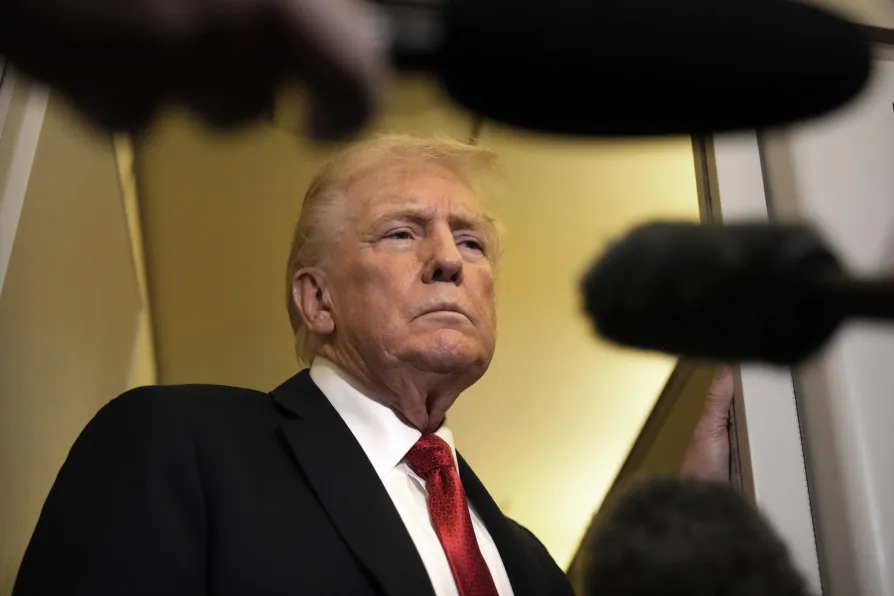
 President Donald Trump speaks to reporters aboard Air Force One, October 19, 2025, en route to Joint Base Andrews, Md., as he returns from a trip to Florida
President Donald Trump speaks to reporters aboard Air Force One, October 19, 2025, en route to Joint Base Andrews, Md., as he returns from a trip to Florida
DONALD TRUMP upends Marx’s famous observation on history repeating itself. If his first term was farce, his second looks more like tragedy.
Trump’s second administration is more serious than his first in its assault on democratic rights in the United States, as well as in its marshalling of far-right forces worldwide to undermine democracy elsewhere. It is also more hegemonic, with centrist politicians from Britain and Europe who viewed him as a passing aberration before now accommodating to his hateful politics.
That means the US military build-up in the Caribbean, accompanied by lawless murders of boat crews in international waters, should be taken seriously.
Trump has long hated Venezuela’s socialist government. But his efforts to overthrow it in his first term were absurd, ranging from recognising unelected clown Juan Guaido as the head of an alternative government that controlled no people or territory (“president of Narnia,” as the actual Venezuelan government quipped) to backing a ludicrous “invasion” led by two former US commandos in a speedboat. These absurdities had deadly consequences, particularly in restricting access to medical aid and Venezuela’s own sovereign assets during the coronavirus pandemic — but they never looked likely to secure regime change.
By contrast, the current concentration of US forces off Venezuela is its biggest Caribbean deployment in decades, consisting of 10,000 troops, warships including amphibious assault vessels, a submarine, fighter jets and attack helicopters. Last week, three B-52 heavy bombers flew from Louisiana and circled for hours just off the Venezuelan coast.
That the US is really considering a military assault is suggested too by its deepening feud with Colombia’s left-wing President Gustavo Petro. Trump suspended military aid to Colombia on Wednesday, warning Petro to “watch it” and threatening “very serious action against him and his country.”
Trump claims Petro is complicit in the illegal drug trade. This, of course, is also the official excuse for bombing boats in the Caribbean.
Washington has not provided any evidence of its victims’ guilt — Ecuador ruled this week that there was none against the sole survivor of one of the bombings — nor would arbitrarily killing alleged drug-smugglers in international waters be lawful if it had (but then, US Defence Secretary Pete Hegseth openly avers his preference for “maximum lethality not tepid legality”). As Mexican President Claudia Sheinbaum warned months ago, the US push to categorise drug cartels as terrorist organisations is not designed to fight them more effectively but to use them as excuses to deploy US troops on Latin American soil.
And Petro makes it still clearer that the drugs talk cloaks Trump’s real agenda. He says he is now in the firing line because Colombia has made it clear it will not permit use of its territory for an invasion of Venezuela.
“What Colombian would help invade where their own family lives, only to see them killed like in Gaza?” he asks, having previously identified Washington’s support for the Gaza genocide as a warning to all countries of the devastation they could face if they defy the US.
An amphibious assault on Venezuela would be far more difficult than a land invasion: Petro’s remarks show he has been under pressure to discuss the latter.
Colombia’s own military has a long and bloody history of atrocities committed under the guise of a “war on drugs,” and of close links to the US; retired officers spoke openly of a potential coup against Petro early in his term.
That prospect has faded, but the capacity of the US to interfere in Colombian politics remains, and it has now designated the left government in Bogota as an obstacle to its core aim: crushing the Bolivarian revolution in Venezuela.
These Latin American governments need our solidarity in resisting US aggression — and we should expose Washington’s fake concern over drug-trafficking as propaganda paving the way for war.










